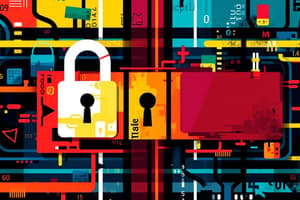Podcast
Questions and Answers
Which type of malware disguises itself as legitimate software until triggered?
Which type of malware disguises itself as legitimate software until triggered?
- Virus
- Rootkit
- Worm
- Trojan Horse (correct)
What is a Denial of Service (DoS) attack primarily designed to do?
What is a Denial of Service (DoS) attack primarily designed to do?
- Create backdoors for unauthorized access
- Steal sensitive data from a server
- Disrupt network access (correct)
- Install malware on a user's computer
Which health concern is associated with injuries from repetitive motions?
Which health concern is associated with injuries from repetitive motions?
- Addiction
- Ergonomic Distress
- Repetitive Strain Injury (correct)
- Computer Vision Syndrome
What type of software is primarily used to protect against viruses?
What type of software is primarily used to protect against viruses?
What practice involves reducing electricity usage and minimizing environmental waste in computing?
What practice involves reducing electricity usage and minimizing environmental waste in computing?
Which of the following categories does NOT belong to cybercriminal classifications?
Which of the following categories does NOT belong to cybercriminal classifications?
What is the primary role of a firewall in computer security?
What is the primary role of a firewall in computer security?
Which of the following best describes Repetitive Strain Injury (RSI)?
Which of the following best describes Repetitive Strain Injury (RSI)?
Which measure is commonly used to deal with a Denial of Service (DoS) attack?
Which measure is commonly used to deal with a Denial of Service (DoS) attack?
What is one of the recommendations related to green computing?
What is one of the recommendations related to green computing?
Flashcards
Computer Security Risk
Computer Security Risk
Any event that could damage or lose hardware, software, data, or processing capability, intentional or accidental.
Malware Types (Virus)
Malware Types (Virus)
Damages files and software secretly without user knowledge.
Malware Type (Worm)
Malware Type (Worm)
A program that replicates itself, using up system resources.
Denial-of-Service (DoS) attack
Denial-of-Service (DoS) attack
Signup and view all the flashcards
Ergonomics
Ergonomics
Signup and view all the flashcards
What is Netiquette?
What is Netiquette?
Signup and view all the flashcards
What are Cybercriminals?
What are Cybercriminals?
Signup and view all the flashcards
Trojan Horse Malware
Trojan Horse Malware
Signup and view all the flashcards
Firewall's Function
Firewall's Function
Signup and view all the flashcards
What is RSI?
What is RSI?
Signup and view all the flashcards
Study Notes
Netiquette
- Netiquette is a set of guidelines for acceptable online behavior, covering email, instant messaging, and web communication.
Computer Security Risks
- Computer security risks are events that could damage or lose hardware, software, data, or processing capabilities.
- Risks can be intentional (cybercrime) or accidental.
Cybercriminal Categories
- Cybercriminals include hackers, crackers, script kiddies, corporate spies, unethical employees, cyberextortionists, and cyberterrorists.
Malware Types
- Virus: Damages files and software without the user knowing.
- Worm: Copies itself and uses system resources.
- Trojan Horse: Masks itself as legitimate software, activating under specific conditions.
- Rootkit: Allows remote control of a computer.
Protection Measures
- Antivirus Software: Detects and removes viruses using techniques like virus signatures and file protection.
- Firewalls: Protect networks from unauthorized access in hardware or software form.
- Denial of Service (DoS) Attacks: Disrupt network access.
- Distributed DoS (DDoS) Attacks: Involve multiple compromised systems.
- Backdoors: Allow attackers to bypass security measures.
Health Concerns in Using Computers
- RSI (Repetitive Strain Injury): Injuries from repetitive motions, including tendonitis and carpal tunnel syndrome.
- CVS (Computer Vision Syndrome): Eye strain and discomfort from prolonged computer use.
- Addiction: Excessive computer use leading to social isolation.
Ergonomics
- Ergonomics is the study of designing comfortable and safe workspaces to improve efficiency and health. This includes proper chair, keyboard, and desk setup.
Green Computing
- Green computing aims to reduce electricity usage and environmental waste in computing.
- Recommendations include using ENERGY STAR devices, turning off unused equipment, and recycling.
Studying That Suits You
Use AI to generate personalized quizzes and flashcards to suit your learning preferences.




